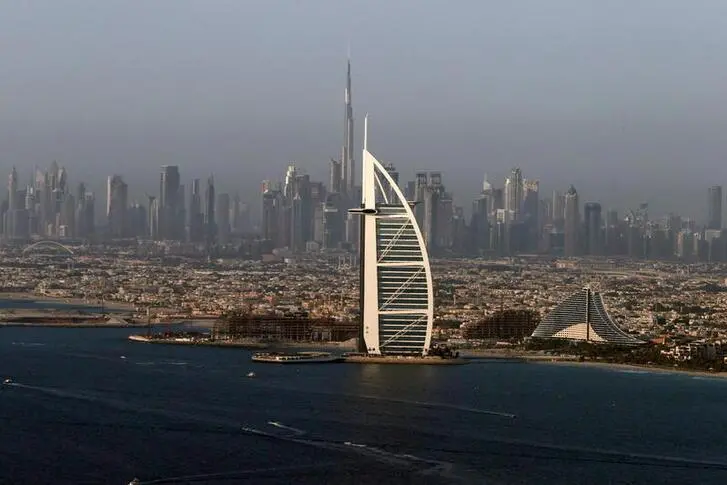PHOTO
On Thursday, Dec. 2, the UAE will celebrate its golden jubilee, marking its 50th National Day. For a UAE national and Emirati woman, witnessing and experiencing the transformative changes over the past few decades has been particularly reflective.
Thinking back to 30 years ago, I remember this country being very different. One of my fondest memories was of my father picking us up from school early on Wednesdays, at about noon. This was when the weekend was still Thursday and Friday. We would drive an hour to Ghantoot, an area between Dubai and Abu Dhabi with beautiful sandy beaches, to spend our weekend. I remember the two-lane road was bare, with infinite billboards stretching for kilometers on end.
It is truly remarkable that, since then, that narrow road has transformed into an engineering marvel comprising 14 lanes, juxtaposed with glimmering towers and crossed with a metro line that was launched during the global economic crisis of 2009.
For me, though, the UAE’s success is not in its man-made islands or indoor ski slopes, but in the subtle elements the country has managed to nurture in a very short period of time. For example, I once left my handbag, with a wallet full of cash and credit cards, by the foot of a table at the beach on a very busy evening, and found it exactly as it was an hour later. Or the fact that I can walk into a hospital and get treated for my ailment, free of charge, and walk out without a second thought or worry.
To chronicle the country’s achievements over the past five decades would require volumes. But to understand the UAE, one needs not to look at its past alone, but also its future. And the past few months have set the tone for the next 50 years.
In an interesting change in strategic planning, the UAE announced in September that it is time for a completely new way of thinking. Vice President and Prime Minister Sheikh Mohammed bin Rashid Al-Maktoum announced “The Principles of the 50” to chart the strategic roadmap for the UAE’s new era of economic, political and social growth. He declared “a new methodology for government work,” in which we will move away from the traditional way of planning (national strategies and long-term plans) in favor of adopting short-term, major transformational projects. This new method will set ambitious targeted priorities, accelerate its achievements and work at a much faster pace than even the UAE is used to.
In simpler terms, the coming cycles will have multi-sectoral teams working on major projects with tight timelines of six months to two years and with very clear and ambitious targets.
In September, the government also launched “Projects of the 50,” which is “a series of developmental and economic projects that aim to accelerate the UAE’s growth, both domestically and internationally, and transform it into a comprehensive hub in all sectors.” Projects of the 50 was the first step toward activating the new methodology.
The first batch of projects included plans to double the size of the economy in 10 years and for new and amended visa schemes and work permits to attract and retain global talent. It also included economic agreements with eight global markets to attract foreign direct investment and increase trade volumes by 40 billion dirhams ($10 billion) annually. The UAE also launched the Fourth Industrial Revolution Network to promote the adoption of advanced technologies in the national industrial sector and announced “Project 5Bn,” which involves the allocation of 5 billion dirhams to support Emirati projects in priority sectors.
The second set of Projects of the 50 launched later in September, comprising 13 initiatives to drive work opportunities for Emiratis in the private sector through reforms and incentives.
Only on Saturday, the UAE enacted the largest legislative reform in its history. A process that usually takes years was fast-tracked in just a few months under the new government methodology. More than 40 laws, including those concerning commercial companies, investments, online security, trade, copyright, the liberalization of residency rules, narcotics and social issues, were changed. The recent reforms to legislative structures signify the way forward and reflect the country’s future aspirations.
Furthermore, the UAE has undertaken some significant shifts in its foreign policy, characterized by the warming of ties with several countries, including Turkey, Syria and Iran, and the normalization of relations with Israel. Only last week, for example, Sheikh Mohammed bin Zayed visited Turkey for the first time in almost a decade and announced the establishment of a $10 billion fund to support investments in the country. The visit marks the start of a new era, in which partnerships and the building of bridges will be central to the next 50 years of development plans.
These recent shifts emphasize several points, the most important one being the broader realignment of the UAE’s priorities to target stronger and more diversified economic goals. Secondly, the economy will lead the UAE’s path for the next 50 years, with a political approach that is based on peace and dialogue that ultimately serves its economic interests. Thirdly, we can’t do this alone. We need good neighbors for stability and talent to drive our growth. Fourth is speed, speed, speed. And fifth is that the UAE is a destination for all to work, live, prosper and retire.
If the last few decades are any indication, the next 50 years will most certainly amaze us. Happy anniversary, UAE.
- Asma I. Abdulmalik is an Emirati civil servant and a writer interested in gender and development issues. Twitter: @Asmaimalik
Copyright: Arab News © 2021 All rights reserved. Provided by SyndiGate Media Inc. (Syndigate.info).





















